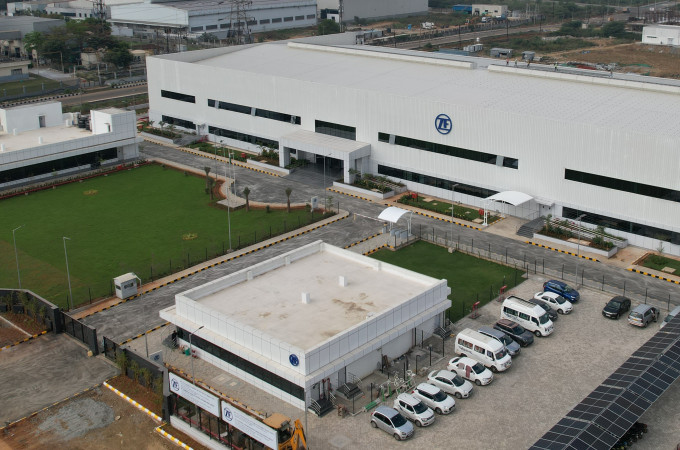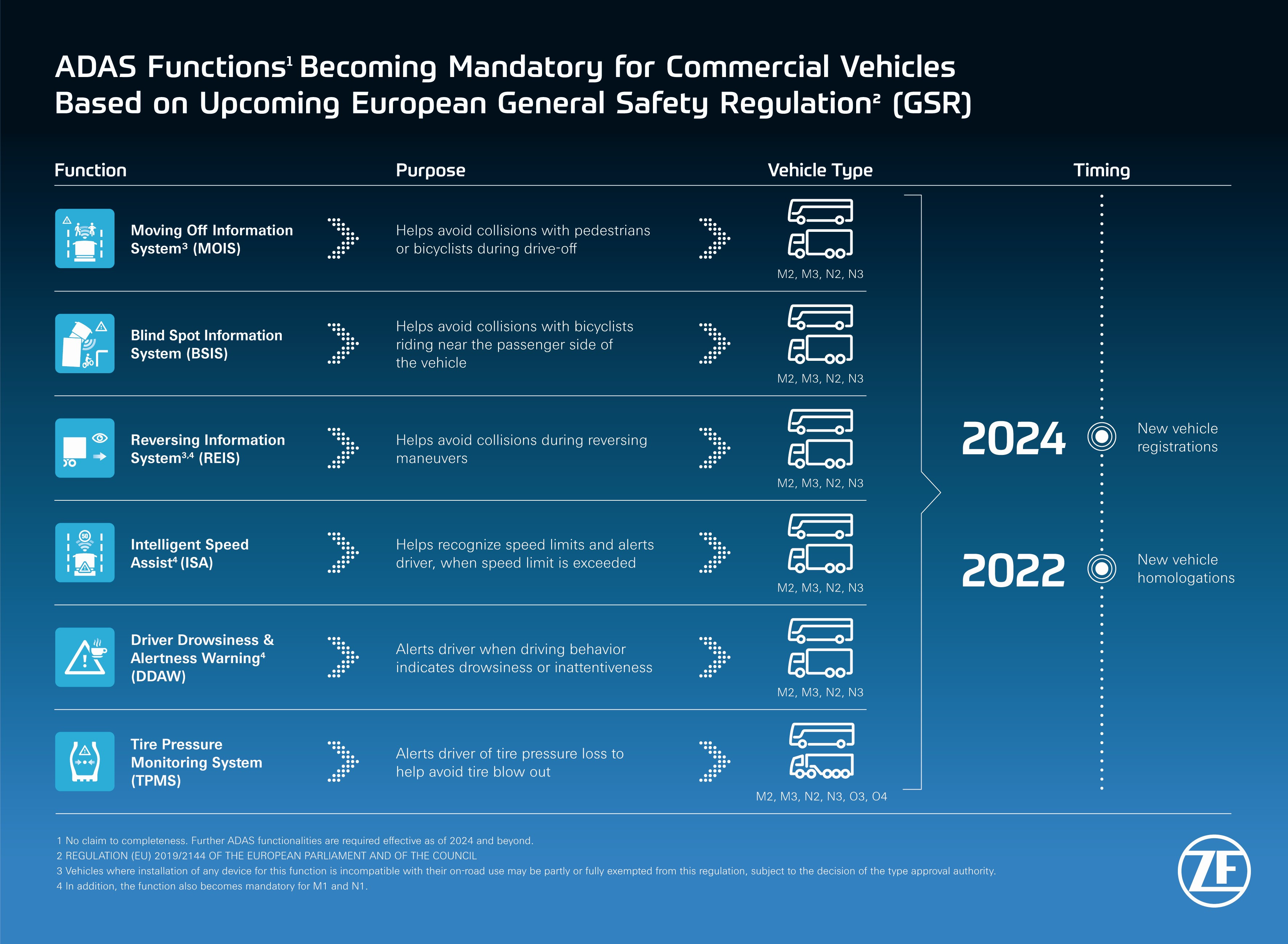ZF CVS India looking to drive revenues through increased market adoption of advanced vehicle systems
By RACE Innovations Pvt Ltd - 27th June 2024

ZF's latest manufacturing plant in Oragadam
India - ZF Commercial Vehicle Control Systems India Ltd (ZF CVS) Chennai, the CV systems and solutions division of ZF Group India, has announced it is implementing its 2021 REFRESH INDIA1 strategy, which focuses on offering next generation mobility solutions through the combination of the ZF technologies, as well as new emerging ACE technologies - Autonomous, Connected and Electrification.
To explain what this means Rajesh Khanna, Director of Race Innovations Pvt Ltd, met up with Mr P Kaniappan, Managing Director, ZF Commercial Vehicle Control Systems India Ltd to discuss REFRESH INDIA. Kaniappan stated that the company’s priority remained on bringing advanced vehicle systems and products to the domestic market as well as new mobility solutions to increase driver and passenger safety, and to improve vehicle efficiency, while reducing emissions.
ZF CVS’s Advanced Safety Systems
Mr Kanniappan explained that ZF now offers a range of systems and solutions designed specifically to significantly reduce accidents on India’s road network. With the introduction of ADAS systems (Advanced Driver Safety Systems), hub to vehicle and vehicle to hub connectivity and, in future, the introduction of automated driving technologies together with electrification, ZF’s goal is to significantly reduce accidents on India’s roads while also achieving India’s goal of carbon net zero by 2070.
Advanced Safety Systems that ZF CVS has introduced includes many proven technologies present on commercial vehicles in European and North American markets. In 2014, ZF introduced ABS (mechanical anti-lock braking system) ahead of regulations for ABS braking in trucks, buses and trailers.
Again, ahead of mandatory regulations, ZF CVS is now offering combined ABS & EBS (Electronic Braking Control Systems), with options for Electronic Stability Control (ESC), and Intelligent Trailer program (ITP) systems to prevent rigid vehicles and articulated combinations from accidents caused by roll overs and jack knifing. Air Disc brakes are also being offered instead of drum brakes, which helps to avoid brake fade, offer shorter stopping distances and provide greater stability control.

ADAS systems by ZF CVS
New braking regulations
With Type II-A test2 braking regulations, which according to Kaniappan is expected to be adopted from the first half of this financial year, ZF CVS’s engineering teams have worked closely with OEMs in India to ensure their range of new vehicles fully comply with the new regulations, whenever they are implemented. Kaniappan said the vehicles were being fitted with appropriate brakes and then tested, validated, and homologated to ensure compliance with the regulatory changes without too much cost implications.
Kaniappan remarked that in other markets normally, such stringent endurance braking regulations could be met only via usage of high-cost secondary braking systems (such as retarders or intarders), whereas ZF CVS India has been able to help OEMs to meet the proposed new regulations with use of just ZF CVS’s foundation braking systems.
The timeframe for introduction of each safety system and advanced technology, like most changes in marketplaces worldwide, has tended to depend on legislation. While efficiency and to some extent safety, are driving forces, inevitably, for significant market uptake of a new technology, legislation is the driving force, and compliance with the new regulations.
Most recently there have been proposals of several new key regulations in India, such as weights and dimensions (see below), braking standards2 and general safety norms such as air conditioning in cabins3.
Kaniappan indicated that the ZF CVS India has been busy helping its customers with technologies that comply with these new regulations, whilst also enhancing performance and safety.
An example of recent regulations (effective 2019) was when India’s permissible gross vehicle weights of rigid trucks was increased to 49 tons GVW and for tractor unit combinations was increased to 55 ton GCW. This allowed increased carrying capacity for trucks and trailers.
As a result of the increased capacity, came the demand for increased braking power, efficiency and safety in the trucks, which ZF CVS India has been able to meet with their ABS systems. Furthermore, new vehicle braking regulations being proposed for market introduction within the next year - see Type II braking regulation below – requires shorter braking distances, requiring fitment of more appropriate retardation and braking systems, such as EBS and transmission retarders.
AMT adoption on the rise
Automated Manual Transmissions (AMTs) together with fully automatic transmissions in Europe are almost the complete norm. Kaniappan stated that there is market readiness to accept AMTs, not only for vehicle performance, but also for driver comfort and safety. He said the demand triggered from OEMs to release new vehicle models with AMTs as an optional feature has stemmed from the new vehicle cycles having been developed for BS VI, introduced in January 2023. The Demand was mainly from niche market segments such as garbage collection vehicles, tippers, city buses and airport buses.
Kaniappan said ZF CVS India has localised the production of the AMT system at its new plant in Oragadam, near Chennai (see below) with the gearboxes being built in the plant in Pune. He added that it has invested considerable capital and engineering hours to make ZF’s AMT systems as cost competitive as possible. In this way, ZF CVS India has endeavoured to make it easier for Indian customers to switch from Manual to Automated gear shift vehicles. Research on the market for AMTs by RACE suggests that in FY 2023, the city bus market uptake was about 4-5% and trucks about 1.5 -2.5%.
ZF CVS India’s decarbonisation programme
Kaniappan said that the introduction of advanced braking and AMT technology was already contributing to decarbonation and particulate emission reductions. Another technology being brought to market is ZF CVS’s globally developed oil free e-compressor, which removes the need for oil.
Other technologies that ZF CVS is working on for the Indian market are adaptations of several products relating to electrification such as electronically integrated air suspensions (ECAS) and electronically controlled pneumatic lift axles for the heavy-duty truck market as well as products that can be used with alternative fuels such as biofuels, gas and biogas vehicles.
Another key area of development is Connectivity / Fleet Digitalization services. As part of this initiative, ZF CVS acquired AssetTrackr Pvt Ltd, a fleet management solutions development in 2017. Renamed ZF DIGITAL Solutions India Pvt Ltd, the company aims to offer customers a full suite of fleet management digital solutions customised for the Indian markets.
ZF opens new chassis components plant in Oragadam
In February this year, the ZF Group set up a new factory in Oragadam, the 18th plant in India for the Group , and the tenth in the state of Tamil Nadu. The factory will deliver chassis components and electric components for light and medium duty commercial vehicles. Details of the plant can be viewed at ZF opens new CV electrical components plant in Tamil Nadu.
Mr. Kanniappan stated the plant is built in accordance with global standards and best practices. The plant’s energy demands are met through renewable energies, mainly solar energy following installation of 450kW of solar panels, supplemented by wind turbine generation. The factory is also designed to capture, recycle and reuse rainwater, Kanniappan said the company expects the factory to be water-neutral by 2025. He also proudly stated that a majority of the total employees at the plant were women, and that the factory operates on a sustainable manner minimizing the use of paper along with advanced IOT driven automated solutions for manufacturing.
Exports accounting for 33%
Exports from India of ZF CVS India currently accounts for approximately 33% of annual revenues. This syncs well with the Indian government’s mission ‘Aatmanirbhar Bharat Abhiyan’. The aim is to make the country and its citizens independent and self-reliant. Kaniappan stated that as ZF CVS division’s business grows it intends to expand its product exports at the same rate.
1 In June 2021, ZF announced it would invest some 200 million euros through its Refresh INDIA strategy to boost sales of advanced technologies in the Commercial Vehicles sector in India. Part of this investment included the integration of the advanced braking and suspension control technologies brought across by its acquisition of WABCO India Ltd in May 2020. Today the two companies of Wabco and ZF operate under the name of ZF Commercial Vehicle Control Systems Ltd.
2 Type II-A test - Vehicles in M2,M3,N1, N2, N3 categories will be mandated to comply with the Endurance Braking System Test (Type II-A test) as specified in IS 11852:2013. This legislation is currently in its draft notification stage. It was supposed to be adopted in FY 2023, but it has been delayed and it is more likely to be adopted within the next year to 18 months, according to consultancy RACE Innovations Inc.
3 In July 2023, a draft notification was produced and put out for consultation by the Ministry of Road Transport and Highways (MoRTH) in Delhi proposing the mandatory installation of air-conditioning systems in the cabins of motor vehicles belonging to N2 and N3 truck categories (i.e., trucks with gross weights and combination weights above 3.5 tons) manufactured from January 1, 2025 onwards was put out for comment and consultation on July 10, 2023, by the Ministry of Road Transport and Highways (MoRTH) in Delhi.



